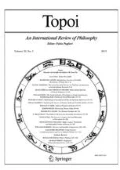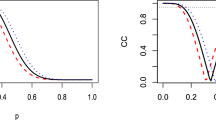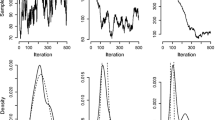Summary
I have argued that CDT is a good rational decision theory; its use leads to the correct recommendations in problems where V-maximization goes wrong. Objections to K-expectation CDT were mentioned in Section 2, and I claimed that they would be answered by the foundation presented above. One of the objections was simply that CDT lacks the foundation that a representation theorem provides; this objection has now been met. Of course, we really seek a good foundation. If we are convinced that the theorem does follow from the axioms, that the uniqueness portion of the theorem is as strong as we would like it to be, and that the utility rule (7) is correct, the relevant question is: Are the conditions placed on rational preference systems by the axioms understandable, plausible, and not overly restrictive? The answer is yes, qualified by the acknowledgement that there are no doubt improvements to be found. Full justification of that answer requires a general discussion of formal, idealized treatments of rational preference and representation theorems for rational decision theory. Such a discussion appears in Armendt (1983). It also requires careful assessment of Axioms (1)–(11) given above; this also appears in Armendt (1983).
The other objections to K-expectation CDT mentioned in section 2 were directed toward the problem of the selection of appropriate K-partitions. These objections have been answered by the statement of the sufficient conditions for appropriate K's given in sections 4 and 5. (Notice that a statement of interesting necessary conditions is likely to be difficult; for a particular decision problem a partition of state descriptions might by coincidence yield an accurate evaluation of action A when used in rule (6) even though the partition fails to satisfy any intuitively correct conditions for appropriate K's). Those conditions describe, as they ought, the behavior of the K propositions in the agent's preferences. And the conditions are simple enough, clear enough, that partitions which satisfy them are readily found in decision problems which require their use.
Similar content being viewed by others
References
Armendt, B.: 1983, Rational Decision Theory: the Foundations of Causal Decision Theory, Ph.D. dissertation for the Department of Philosophy, University of Illinois at Chicago.
Armendt, B.: forthcoming, ‘Conditional preference and causal expected utility’, to appear in Proceedings of the Conference on Probability and Causation held at the University of California, Irvine in July 1985.
Balch, M. and P. Fishburn: 1974, ‘Subjective expected utility for conditional primitives’, in Essays on Economic Behavior under Uncertainty, M. Balch, D. McFadden, and S. Wu (eds.), North-Holland, Amsterdam.
Eells, E.: 1982, Rational Decision and Causality, Cambridge University Press, Cambridge.
Fishburn, P.: 1973, ‘A mixture-set axiomatization of conditional subjective expected utility’, Econometrica 41, 1–25.
Essays on Economic Behavior under Uncertainty, M. Balch, D. McFadden, and S. Wu (eds.), North-Holland, Amsterdam.
Gibbard, A. and W. Harper: 1976, ‘Counterfactuals and two kinds of expected utility’, in Ifs, Harper, Stalnaker, and Pearce (eds.), Reidel, Dordrecht.
Herstein, I. and J. Milnor: 1953, ‘An axiomatic approach to measurable utility’, Econometrica 21, 291–297.
Jeffrey, R.: 1965, The Logic of Decision, Wiley, New York.
Jeffrey, R.: 1981, ‘The logic of decision defended’, Synthese 48, 473–92.
Jeffrey, R.: 1983, The Logic of Decision, 2nd edition, University of Chicago Press, Chicago.
Lewis, D.: 1969, Convention: A Philosophical Study, Harvard University Press, Cambridge.
Lewis, D.: 1976, ‘Convention: A reply to Jamieson’, Canadian Journal of Philosophy 6, 113–120.
Lewis, D.: 1981, ‘Causal decision theory’, Australasian Journal of Philosophy 59, 5–30.
Luce, R. D. and D. Krantz: 1971, ‘Conditional expected utility’, Econometrica 39, 253–271.
Salmon, W.: 1973, ‘Reply to Lehman’, Philosophy of Science 40, 397–402.
Savage, Leonard J.: 1954, The Foundations of Statistics, Wiley, New York.
Skyrms, B.: 1979, Causal Necessity, Yale University Press, New Haven.
Skyrms, B.: 1982, ‘Causal decision theory’, Journal of Philosophy 79, 695–711.
Sobel, J. Howard: 1978, Probability, Chance, and Choice: A Theory of Rational Agency, unpublished.
Stalnaker, R.: 1972, ‘Letter to David Lewis’, in Ifs, Harper, Stalnaker, Pearce (eds.), Reidel, Dordrecht.
von Neumann, J. and O. Morgenstern: 1947, Theory of Games and Economic Behavior, 2nd edition, Princeton University Press, Princeton.
Author information
Authors and Affiliations
Additional information
The ideas contained in this paper were presented and discussed in talks at the University of Minnesota at Duluth and Brown University; an early version of the paper was read at a conference on decision theory run by the Philosophy Department at Ohio State University in February, 1984. I benefited from each of those discussions. This paper is based on parts of my 1983 doctoral dissertation at the University of Illinois, Chicago. I especially thank Brian Skyrms and Paul Teller for their excellent criticisms and advice.
Rights and permissions
About this article
Cite this article
Armendt, B. A foundation for causal decision theory. Topoi 5, 3–19 (1986). https://doi.org/10.1007/BF00137825
Issue Date:
DOI: https://doi.org/10.1007/BF00137825




